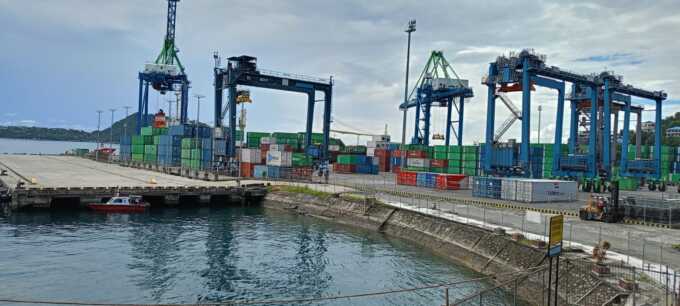News
Mining sector issues affected Central Papua economy in Q1 2025
WINDONESIA July 4, 2025 The Port of Jayapura. (Cenderawasih Pos/Priyadi)
The Port of Jayapura. (Cenderawasih Pos/Priyadi)
Statistics Indonesia (BPS) Papua has submitted an official report on the Central Papua economy for the first quarter (Q1) of 2025. BPS Papua Head Intan Selfina N. Sinaga explained that the province's economic growth contracted by 25.53 percent year-on-year (yoy), largely due to a significant decline in the mining and quarrying sector that is the main contributor to the region's gross domestic product (GDP).
"Central Papua has recorded an economic structure that is highly dependent on the mining and quarrying sector, which contributed 73 percent of the total [regional] GDP. Therefore, any changes in mining production activities directly affect the direction of [the province's] economic growth," stated Intan in the report.
She explained that the mining and quarrying sector's sharp decline was caused by several crucial factors. First, the expiration of PT Freeport Indonesia (PTFI)'s copper concentrate export permit at the end of 2024. Second, the extension of the export permit which was only carried out by mid-March 2025, which caused a gap in distribution. Third, the smelter fire in Gresik Regency, East Java Province in October 2024 which hampered the delivery of copper concentrate from Mimika Regency, Central Papua.
The above factors disrupted mining distribution, piled up concentrate stocks, and restricted mining activities. The construction sector, which is closely related to mining, also experienced a contraction.
Although Central Papua's aggregate growth contracted, BPS emphasized that the province's GDP excluding the mining sector recorded 2.35 percent yoy growth. The trade, transportation, information and communication, financial services, real estate, as well as education and health services sectors all recorded growth in Q1 2025, indicating their potential for further development.
In terms of expenditures, household consumption grew by 4.38 percent yoy, indicating that the purchasing power of Central Papua's people is still maintained. Government expenses grew by 7.13 percent, which was still suboptimal amid the transition period for a new provincial government.
Central Papua's gross fixed capital formation (GFCF) contracted by 2.62 percent due to a decrease in investments to the mining sector and regional capital expenditure (capex). Exports of goods and services dropped steeply by 54.55 percent due to export restrictions.
BPS recommends several strategic solutions to maintain economic growth in Central Papua. In the short term, the province is advised to include improving the mining production process through licensing and security stability, and optimizing government spending by prioritizing spending on local products and services.
In the long term, Central Papua is advised to reduce dependence on the mining sector, develop potential sectors such as agriculture, fisheries, processing industry, and tourism, improve the quality of human resources through education and health, build infrastructure to drive the economy such as roads to production centers, electricity, and communication networks.

